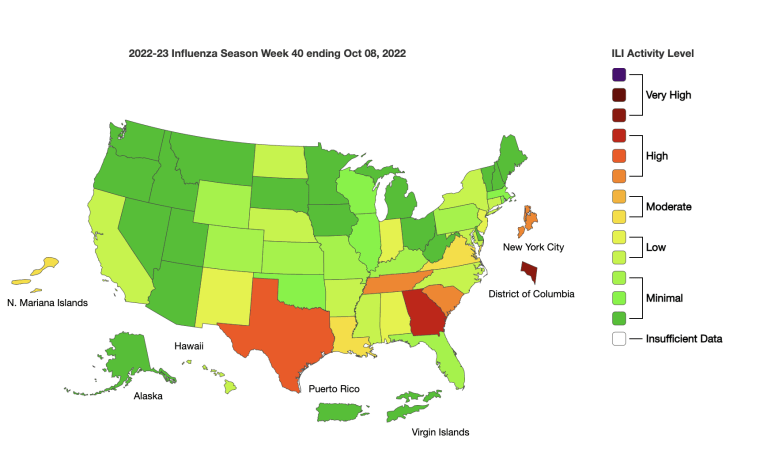Reports of flu and other respiratory illnesses are higher than what would normally be seen in the U.S. at this time of year, according to the Centers for Disease Control and Prevention.
"We've noted that flu activity is starting to increase across much of the country," especially in the Southeast and south-central U.S., the CDC's director, Dr. Rochelle Walensky, told NBC News.
"Not everybody got flu vaccinated last year, and many people did not get the flu. So that makes us ripe to have potentially a severe flu season."
Typical flu seasons ramp up in December and usually peak in February.
On Friday, the CDC reported that the flu and similar viral illnesses are notably high in Georgia, New York City, South Carolina, Tennessee, Texas and Washington, DC.
Most of those are influenza A, specifically a strain called H3N2. While any version of the flu can be dangerous in vulnerable populations, this strain has been known to cause more severe illness.

Doctors are not required to report each positive flu test to public health officials, so the CDC and others monitor probable flu activity by looking at "influenza-like illnesses." Those are defined as having a fever of at least 100 degrees and a cough and/or sore throat without any other known cause.
Dr. James Cutrell, an infectious disease expert at UT Southwestern Medical Center in Dallas, said that “we are definitely seeing a pretty steep rise” in documented flu and influenza-like illnesses, including in both children and adults.
On Wednesday, a San Diego school district said there were "hundreds" of absences at a local high school, likely due to an outbreak of the flu, NBC affiliate KNSD reported. Most kids said they were experiencing cough, sore throat, congestion and fever.
Tests for Covid so far have been negative, the station reported. Several students, however, have tested positive for the flu.
"Unfortunately, we anticipated this would be a rough influenza season," said Dr. Cameron Kaiser, deputy public health officer for the County of San Diego Health and Human Services Agency, per KNSD reporting. "Alongside Covid-19, other respiratory viruses are also making a rapid comeback."
This includes respiratory syncytial virus, or RSV.
"Right now, we're in a huge spike of RSV," said Dr. Frank Esper, an infectious diseases expert at the Cleveland Clinic. RSV often affects babies but can also be problematic in adults with underlying lung problems, such as asthma and chronic obstructive pulmonary disease.
Esper said that cases of RSV are usually seen in December and January, but for the past two years, the typical RSV season has come earlier, during summer and early autumn. Rhinoviruses and enteroviruses are also circulating earlier than usual. This is because measures to curb Covid spread didn't allow other viruses to spread as they historically have.
"Flu is on the rise, but it's also all of these other viruses that got knocked off kilter," Esper said. "This might be the new normal. We don't know."
There is no vaccine for RSV; however, there is one for influenza. So far this year, Walensky said, "about 12 million flu vaccines have been given in pharmacies and in physician's offices."
That's slightly less than the number of doses given this time last year, she said, acknowledging that vaccine fatigue could be contributed to the lower rate so far.
It takes about two weeks after a flu vaccine injection to provide full protection. The CDC recommends everyone ages 6 months and older get an annual flu shot.
"We do want to get people protected before they have influenza in their own communities," Walensky said.
Follow NBC HEALTH on Twitter & Facebook.
